Unit2lessonsfromJefferson(格式正确版)
Unit 2 Lessons from Jefferson
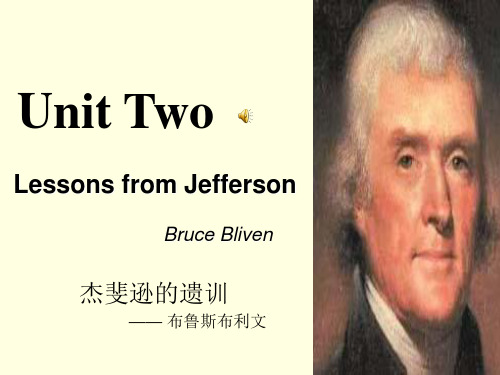
Vocabulary
declaration besides committee threaten error conflict philosophy conservation create
independence investigate humble reject judgment criticism constitution superior anniversary
Background information
Jefferson and the French Revolution Jefferson served as minister to France from 1785 to
1789 when revolution was imminent in France. He sympathized with the revolution, feeling it was similar in purpose to the American Revolution. Thanks to his political writings and his legal reforms in Virginia, French reformers regarded Jefferson as a champion of liberty. Marquis de Lafayette, who had fought for America’s Independence, and other advocates of democratic principles often sought his advice.
George Washington
Abraham Lincoln
Franklin D. Roosevelt
Unit 2 Lessons from Jefferson
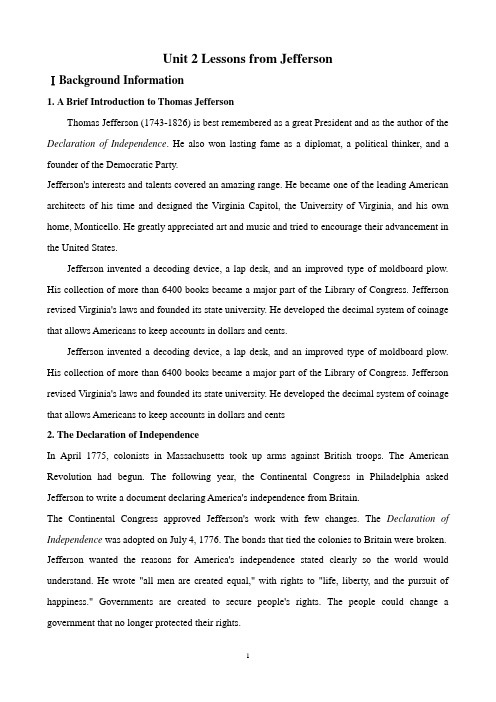
Unit 2 Lessons from JeffersonⅠBackground Information1. A Brief Introduction to Thomas JeffersonThomas Jefferson (1743-1826) is best remembered as a great President and as the author of the Declaration of Independence. He also won lasting fame as a diplomat, a political thinker, and a founder of the Democratic Party.Jefferson's interests and talents covered an amazing range. He became one of the leading American architects of his time and designed the Virginia Capitol, the University of Virginia, and his own home, Monticello. He greatly appreciated art and music and tried to encourage their advancement in the United States.Jefferson invented a decoding device, a lap desk, and an improved type of moldboard plow. His collection of more than 6400 books became a major part of the Library of Congress. Jefferson revised Virginia's laws and founded its state university. He developed the decimal system of coinage that allows Americans to keep accounts in dollars and cents.Jefferson invented a decoding device, a lap desk, and an improved type of moldboard plow. His collection of more than 6400 books became a major part of the Library of Congress. Jefferson revised Virginia's laws and founded its state university. He developed the decimal system of coinage that allows Americans to keep accounts in dollars and cents2. The Declaration of IndependenceIn April 1775, colonists in Massachusetts took up arms against British troops. The American Revolution had begun. The following year, the Continental Congress in Philadelphia asked Jefferson to write a document declaring America's independence from Britain.The Continental Congress approved Jefferson's work with few changes. The Declaration of Independence was adopted on July 4, 1776. The bonds that tied the colonies to Britain were broken. Jefferson wanted the reasons for America's independence stated clearly so the world would understand. He wrote "all men are created equal," with rights to "life, liberty, and the pursuit of happiness." Governments are created to secure people's rights. The people could change a government that no longer protected their rights.II. New Words and Expressions1.obtain: v. get through effortWhere can I obtain the book?我在哪里能买到这本书?He obtained the property with a bank loan.他通过向银行贷款买下了那份房产。
大英unit2lessons from jefferson
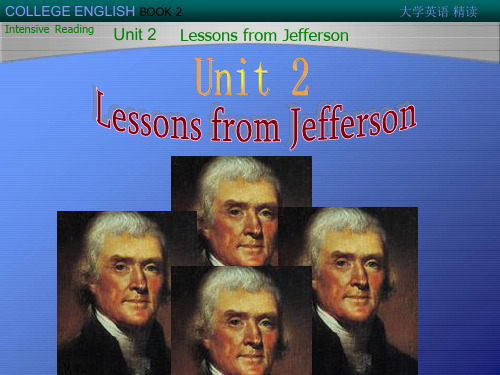
(积极主动或消极被动),并不强调通过预先的或主观的努力, 与具体名词和抽象名词均可搭配
obtain 为正式用语,指经过长时间的努力或有计划的行动而
得到所希望得 到的东西或达到预定的目标。
achieve 表示克服困难之后取得成功或实现预期目标。 acquire 指经过一定努力或一定过程,使原有的东西获得更
Home
COLLEGE ENGLISH BOOK 2
Intensive Reading
大学英语 精读
Unit 2
Lessons from Jefferson
(L29) latter: adj.
两者中后者比前者好得多。
S Of the two the latter is far better than the former.
Origin 指事物起始于某时或某处,或由其产生另一事,即“起源
起因,由来”,有时也指“出身,血统”。
S He never forgot his humble origins.
Home
COLLEGE ENGLISH BOOK 2
Intensive Reading
大学英语 精读
Unit 2
Lessons from Jefferson
COLLEGE ENGLISH BOOK 2
Intensive Reading
大学英语 精读
Unit 2
Lessons from Jefferson
COLLEGE ENGLISH BOOK 2
Intensive Reading
大学英语 精读
Unit 2
Lessons from Jefferson
Pre-reading
(L53) Superior: adj.
大英unit2lessons from jefferson

Intensive Reading
大学英语 精读
Unit 2
Lessons from Jefferson
Language Points --Jefferson believed that a free man obtains knowledge from many sources besides books and that personal investigation is important. How many object clauses in this sentence?
大学英语 精读
Unit 2
Lessons from Jefferson
Oral Practice 1. Questions.
Directions: Work in groups of four to discuss about the following questions.
1) What ideas of Jefferson’s do you appreciate most? 2) Do you think they are still of use to us today? Why?
COLLEGE ENGLISH BOOK 2
Intensive Reading
大学英语 精读
Unit 2
Lessons from Jefferson
source & origin
Source 原指“水源”,转义指事物的“根源,起因或出处”。
S S
That well is the source of all the cases of infection Is the water polluted at source or further downstream?
Unit2LessonsfromJefferson

Thomas Jefferson
• Thomas Jefferson (17431826) is best remembered as a great President and as the author of the Declaration of Independence. He also won lasting fame as a diplomat, a political thinker, and a founder of the Democratic Party.
• In 2004, Obama was elected as a U.S. Senator. He made history in 2008 when he won the U.S. presidential election. He is also the winner of the 2009 Nobel Peace Prize. He won the Nobel Peace Prize for his "extraordinary efforts to strengthen international diplomacy and cooperation between peoples."
Depression by his New Deal. The only American president to serve
more than two terms.
Richard Milhous Nixon the 37th president of the United States the first American president to visit China
大学英语精读第二册 Unit 2 Lessons from Jefferson_共3页

Jefferson died long ago, but many of his ideas are still of great interest.Unit2 Lessons from JeffersonThomas Jefferson, the third President of the United States, may be less famous than George Washington and Abraham Lincoln, but most people remember at last one fact about him: he wrote the Declaration of Independence.Although Jefferson lived more than 200 years ago, there is much that we learn from him today. Many of his ideas are especially interesting to modern youth. Here are some of the things he said and wrote:1. Go and see. Jefferson believed that a free man obtains knowledge from many sources besides books and that personal investigation is important. When still a young man, he was appointed to a committee to find out whether the South Branch of the James River was deep enough to be used by large boats. While the other members of the committee sat in the state capitol and studied papers on the subject, Jefferson got into a canoe and made on-the-spot- observations.2. You can learn from everyone. By birth and by education Jefferson belonged to the highest social class. Yet, in a day when few noble persons ever spoke to those of humble origins except to give an order, Jefferson went out of his way to talk with gardeners, servants, and waiters. Jefferson once said to the French nobleman, Lafayette, "You must go into the people's homes as I have done, look into their cooking pots and eat their bread. If you will only do this, you may find out why people are dissatisfied and understand the revolution that is threatening France."3. Judge for yourself. Jefferson refused to accept other people's opinions without careful thought. "Neither believe nor reject anything," he wrote to his nephew, "because any other person has rejected or believed it. Heaven has given you a mind for judging truth and error. Use it."Jefferson felt that the people "may safely be trusted to hear everything true and false, and to form a correct judgment. Were it left to me to decide whether we should have a government without newspapers or newspapers without a government, I should not hesitate a moment to prefer the latter."4. Do what you believe is right. In a free country there will always be conflicting ideas, and this is a source of strength. It is conflict and not unquestioning agreement that keeps freedom alive. Though Jefferson was for many years the object of strong criticism, he never answered his critics. He expressed his philosophy in letters to a friend, "There are two sides to every question. If you take one side with decision and on it with effect, those who take the other side will of course resent your actions."5. Trust the future; trust the young. Jefferson felt that the present should never be chained to customs which have lost their usefulness. "No society," he said, "can make a perpetual constitution, or even a perpetual law. The earth belongs to the living generation." He did not fear new ideas, nor did he fear the future. "How much pain," he remarked, "has been caused by evils which have never happened! I expect the best, not the worst. I steer my ship with hope, leaving fear behind."6. Jefferson's courage and idealism were based on knowledge. He probably knew more than any other man of his age. He was an expert in agriculture, archeology, and medicine. He practiced crop rotation and soil conservation a century before these became standard practice, and he invented a plow superior to any other in existence. He influenced architecture throughout America, and he was constantly producing devices for making the tasks of ordinary life easier to perform.7. Of all Jefferson's many talents, one is central. He was above all a good and tireless writer. His complete works, now being published for the first time, will fill more than fifty volumes. His talent as an author was soon discovered, and when the time came to write the Declaration of Independence at Philadelphia in 1776, the task of writing it was his. Millions have thrilled to his words: "We hold these truths to be self-evident, that all men are created equal…"8. When Jefferson died on July 4, 1826, the 50th anniversary of American independence, he left his countrymen a rich legacy of ideas and examples. American education owes a great debt to Thomas Jefferson, who believed that only a nation of educated people could remain free.大学英语精读第二册Unit 3 My First JobTrying to make some money before entering university, the author applies for a teaching job. But the interview goes from bad to worse... My First JobWhile I was waiting to enter university, I saw advertised in a local newspaper a teaching post at a school in a suburb of London about ten miles from where I lived. Being very short money and wanting to do something useful, I applied, fearing as I did so, that without a degree and with no experience in teaching my chances of getting the job were slim.However, three days later a letter arrived, asking me to go to Croydon for an interview. It proved an awkward journey: a train to Croydon station; a ten-minute bus ride and then a walk of at least a quarter to feel nervous.The school was a red brick house with big windows, The front garden was a gravel square; four evergreen shrubs stood at each corner, where they struggled to survive the dust and fumes from a busy main from a busy main road.It was clearly the headmaster himself that opened the door. He was short and fat. He had a sandy-coloured moustache, a wrinkled forehead and hardly any hair. He looked at me with an air of surprised disapproval, as a colonel might look at a private whose bootlaces were undone. 'Ah yes,' he grunted. 'You'd better come inside.' The narrow, sunless hall smelled unpleasantly of stale cabbage; the walls were dirty with ink marks; it was all silent. His study, judging by the crumbs on the carpet, was also his dining-room. 'You'd better sit down,' he said, and proceeded to ask me a number of questions: what subjects I had taken in my General School Certificate; how old I was; what games I played; then fixing me suddenly with his bloodshot eyes, he asked me whether I thought games were a vital part of a boy's education. I mumbled something about not attaching too much importance to them. He grunted. I had said the wrong thing. The headmaster and I obviously had very little in common.The school, he said, consisted of one class of twenty-four boys, ranging in age from seven to thirteen. I should have to teach all subjects except art, which he taught himself. Football and cricket were played in the Park, a mile away on Wednesday and Saturday afternoons.The teaching set-up filled me with fear. I should have to divide the class into three groups and teach them in turn at three different levels; and I was dismayed at the thought of teaching algebra and geometry-two subjects at which I had been completely incompetent at school. Worse perhaps was the idea of Saturday afternoon cricket; most of my friends would be enjoying leisure at that time. I said shyly, 'What would my salary be?' 'Twelve pounds a week plus lunch.' Before I could protest, he got to his feet. 'Now', he said, 'you'd better meet my wife. She's the one who really runs this school.'This was the last straw. I was very young: the prospect of working under a woman constituted the ultimate indignity.。
大学英语精读第三版第二册课文翻译
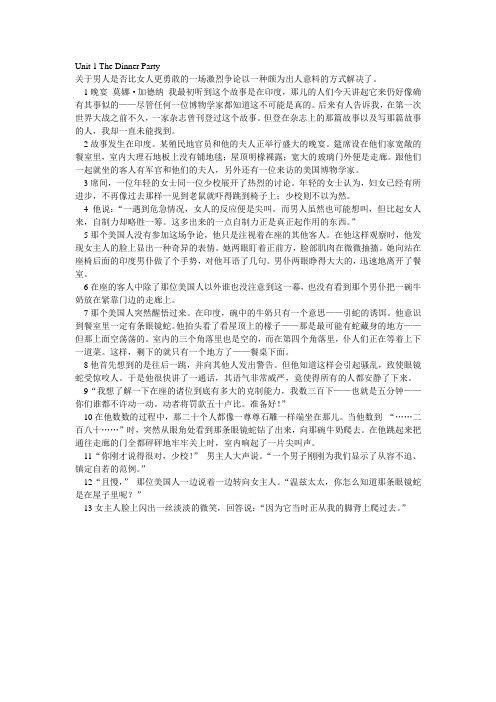
Unit 1 The Dinner Party关于男人是否比女人更勇敢的一场激烈争论以一种颇为出人意料的方式解决了。
1晚宴莫娜·加德纳我最初听到这个故事是在印度,那儿的人们今天讲起它来仍好像确有其事似的——尽管任何一位博物学家都知道这不可能是真的。
后来有人告诉我,在第一次世界大战之前不久,一家杂志曾刊登过这个故事。
但登在杂志上的那篇故事以及写那篇故事的人,我却一直未能找到。
2故事发生在印度。
某殖民地官员和他的夫人正举行盛大的晚宴。
筵席设在他们家宽敞的餐室里,室内大理石地板上没有铺地毯;屋顶明椽裸露;宽大的玻璃门外便是走廊。
跟他们一起就坐的客人有军官和他们的夫人,另外还有一位来访的美国博物学家。
3席间,一位年轻的女士同一位少校展开了热烈的讨论。
年轻的女士认为,妇女已经有所进步,不再像过去那样一见到老鼠就吓得跳到椅子上;少校则不以为然。
4他说:“一遇到危急情况,女人的反应便是尖叫。
而男人虽然也可能想叫,但比起女人来,自制力却略胜一筹。
这多出来的一点自制力正是真正起作用的东西。
”5那个美国人没有参加这场争论,他只是注视着在座的其他客人。
在他这样观察时,他发现女主人的脸上显出一种奇异的表情。
她两眼盯着正前方,脸部肌肉在微微抽搐。
她向站在座椅后面的印度男仆做了个手势,对他耳语了几句。
男仆两眼睁得大大的,迅速地离开了餐室。
6在座的客人中除了那位美国人以外谁也没注意到这一幕,也没有看到那个男仆把一碗牛奶放在紧靠门边的走廊上。
7那个美国人突然醒悟过来。
在印度,碗中的牛奶只有一个意思——引蛇的诱饵。
他意识到餐室里一定有条眼镜蛇。
他抬头看了看屋顶上的椽子——那是最可能有蛇藏身的地方——但那上面空荡荡的。
室内的三个角落里也是空的,而在第四个角落里,仆人们正在等着上下一道菜。
这样,剩下的就只有一个地方了——餐桌下面。
8他首先想到的是往后一跳,并向其他人发出警告。
但他知道这样会引起骚乱,致使眼镜蛇受惊咬人。
于是他很快讲了一通话,其语气非常威严,竟使得所有的人都安静了下来。
《大学英语精读》第三版第2册Unit_2_Lessons_from_Jefferson
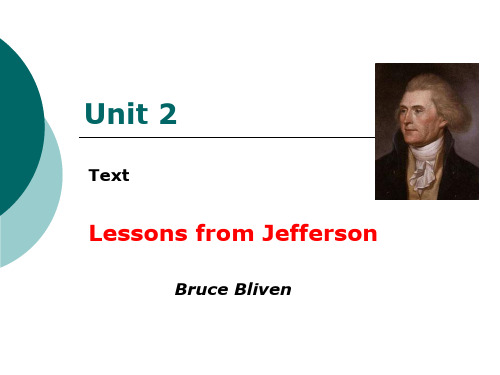
Lessons from Jefferson
Useful expressions Text interpretation Word family Sentence structure Translation Reading skill Guided writing Homework
Text interpretation
What type is the text? A. narration B. exposition C. description D. argumentation
记叙文 说明文 描述文 议论文
The text is mainly an exposition of Jefferson’s insightful ideas.
Reading skill
3.
Using context clues for word meanings
Definition, restatement, general knowledge, related information, examples, comparison, contrast
7.
Word family
Declare, announce, independently, gain, in addition to, apart from, except for, investigate, appointment, originate, original, dissatisfaction, niece, hesitant, criticize, philosopher, resentful, temporary, remarkable, vice, sinful, idealist, inferior, influential, thrilled, heritage. More words on pp.35, 36, 37
大学英语精读第二册 Unit 2lessons from Jefferson

2. Of the American presidents, how many do you
know?
1.George Washington 乔治·华盛顿: 1789-1797 2.John Adams 约翰·亚当斯: 1797-1801 3.Thomas Jefferson托马斯·杰斐逊 : 1801-1809 4.Abraham Lincoln 亚伯拉罕·林肯: 1861-1865 5.Franklin D. Roosevelt 富兰克林·罗斯福: 1933-1945 6.Harry S. Truman 哈里·杜鲁门: 1945-1953 7.John F. Kennedy 约翰·肯尼迪: 1961-1963 8.Richard M. Nixon 理查德·尼克松: 1969-1974 9.Gerald Ford 杰拉尔德·福特: 1974-1977 10.Ronald Reagan 罗纳德·里根 : 1981-1989 11.George Bush 乔治·布什: 1989-1993 12.Bill Clinton 比尔·克林顿 : 1993-2001 13.Barack Hussein Obama Jr.巴拉克·侯赛因·奥巴马(小)2009-
Attended the College of William and Mary, where he studied law.
1769
Joined the Virginia colonial legislature (立法
机关).
1772
Married a well-to-do widow, Martha Wayles Skelton.
Unit 2 Lessons from Jefferson

Remarks from Declaration of Independence
• We hold these truths to be self-evident, that all men are created equal, that they are endowed by their creator with certain rights, that among these are life, liberty and pursuit of happiness. • 我们认为下面这些真理是不言而喻的:人人生而 平等,造物者赋予他们若干不可剥夺的权利,其 中包括生命权、自由权和追求幸福的权利。
Company Logo
Life Story about Thomas Jefferson
One of the most important documents in the history of America. Published on July 4, 1779 at the second Continental Congress. Marks the beginning of a new nation. July 4 has become the national day.
elected to a second term in 1996
His wife is the third female Secretary of State
Famous Presidents in American History
George Walker Bush
elected governor of Texas in 1994
Company Logo
Unit 2 Lessons from Jefferson
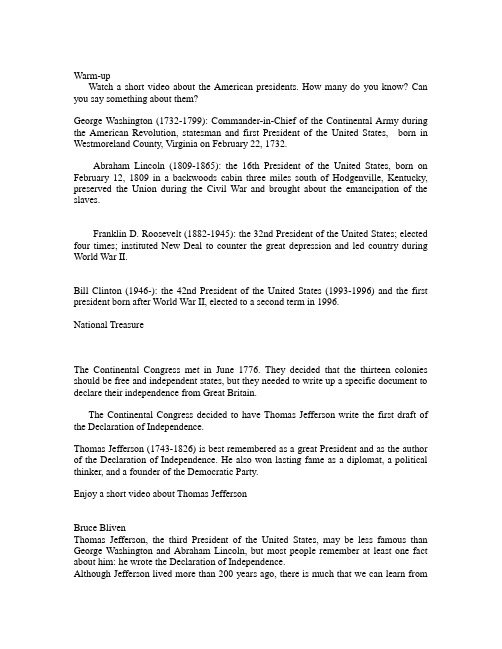
Warm-upWatch a short video about the American presidents. How many do you know? Can you say something about them?George Washington (1732-1799): Commander-in-Chief of the Continental Army during the American Revolution, statesman and first President of the United States, born in Westmoreland County, Virginia on February 22, 1732.Abraham Lincoln (1809-1865): the 16th President of the United States, born on February 12, 1809 in a backwoods cabin three miles south of Hodgenville, Kentuck y, preserved the Union during the Civil War and brought about the emancipation of the slaves.Franklin D. Roosevelt (1882-1945): the 32nd President of the United States; elected four times; instituted New Deal to counter the great depression and led country during World War II.Bill Clinton (1946-): the 42nd President of the United States (1993-1996) and the first president born after World War II, elected to a second term in 1996.National TreasureThe Continental Congress met in June 1776. They decided that the thirteen colonies should be free and independent states, but they needed to write up a specific document to declare their independence from Great Britain.The Continental Congress decided to have Thomas Jefferson write the first draft of the Declaration of Independence.Thomas Jefferson (1743-1826) is best remembered as a great President and as the author of the Declaration of Independence. He also won lasting fame as a diplomat, a political thinker, and a founder of the Democratic Party.Enjoy a short video about Thomas JeffersonBruce BlivenThomas Jefferson, the third President of the United States, may be less famous than George Washington and Abraham Lincoln, but most people remember at least one fact about him: he wrote the Declaration of Independence.Although Jefferson lived more than 200 years ago, there is much that we can learn fromhim today. Many of his ideas are especially interesting to modern youth. Here are some of the things he said and wrote:Declarationn. document containing an open public announcementObama will make a declaration of candidacy again for the presidential campaigns in 2012.Fill in this customs baggage declaration form, please.请把这份海关行李申报单填好。
大学英语精读第二册课件Unit 2
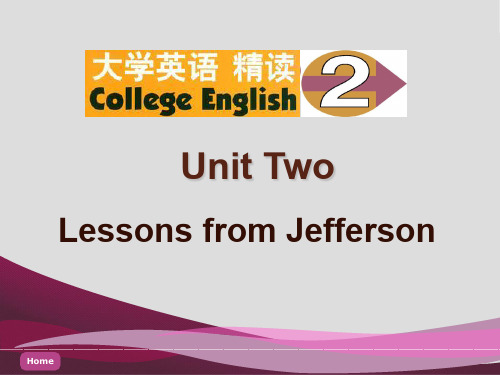
any other man of his age.”
– A statesman – A writer – A diplomat – A political thinker – An expert in agriculture,
Cultural Notes America’s Founding Fae third president of the U. S.
H1o1m /11e/2019
Thomas Jefferson
Lessons from Jefferson
• The author of the Declaration of Independence.
Unit Two
Lessons from Jefferson
Home
1
Pre-reading
2 Global reading
3 Detailed reading
4 Post-reading
5 Assignment
Home
Lessons from Jefferson
Pre-reading
Thomas Jefferson
Topic Introduction
1
2
3
Cultural Notes
Home
Lessons from Jefferson
Thomas Jefferson
Who was Thomas Jefferson? What do you know about him?
• Thomas Jefferson
• 托马斯·杰斐逊
H1o1m /11e/2019
【VIP专享】UNIT2 lesson from Jefferson (来自Jefferson 的启示)
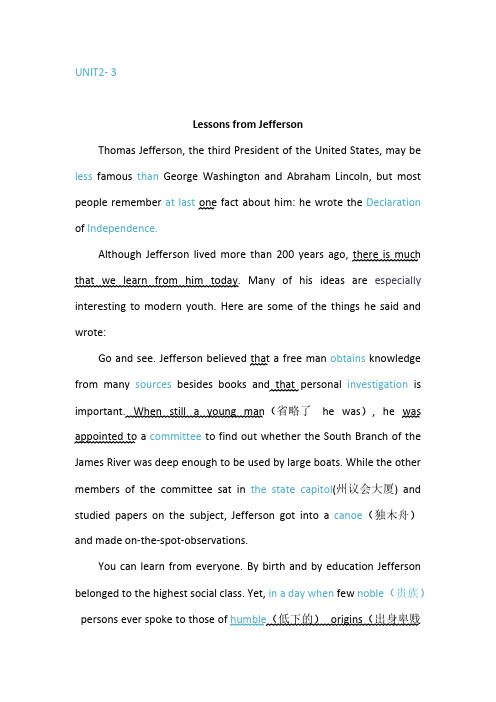
UNIT2- 3Lessons from Jefferson Thomas Jefferson, the third President of the United States, may be less famous than George Washington and Abraham Lincoln, but most people remember at last one fact about him: he wrote the Declaration of Independence. Although Jefferson lived more than 200 years ago, there is much that we learn from him today. Many of his ideas are especially interesting to modern youth. Here are some of the things he said and wrote: Go and see. Jefferson believed that a free man obtains knowledge from many sources besides books and that personal investigation is important. When still a young man(省略了he was), he was appointed to a committee to find out whether the South Branch of the James River was deep enough to be used by large boats. While the other members of the committee sat in the state capitol(州议会大厦) and studied papers on the subject, Jefferson got into a canoe(独木舟)and made on-the-spot-observations. You can learn from everyone. By birth and by education Jefferson belonged to the highest social class. Yet, in a day when few noble(贵族)persons ever spoke to those of humble(低下的)origins(出身卑贱的人,下等人)except to give an order发号施令), Jefferson went out of his way to(go out of one’s way to do sth.特地地,不怕麻烦地去做某事)talk with gardeners(园丁。
Unit 2 Lessons from Jefferson-词汇

Focal Pattern
• Leave to : give into the care or charge of
someone(交托, 委托) e.g. I'll leave everything to you then. • Leave behind: abandon, forget to take or bring along (把…留下) e.g. I must go back, I've left my car keys. I’ve left the umbrella behind.
Unit 2
Lessons from Jefferson
Para. 9
杰佛逊的勇气和理想主义以知识为基础。
他懂得的东西也许比同时代的人都要多。 他是农业,考古学和医学的专家。在人们 普遍采用农作物轮作和土壤保持的做法以 前的一个世纪,他就这样做了。他还发明 了一种比当时任何一种都好的耕犁。 他影 响了美国的建筑业,他还不断地制造出各 种器械装置,使日常生活中需要做的许多 工作变得更加容易。
go out of one’s way to do something
特别费心地做事;不怕麻烦地做某事 She always goes out of her way to please her guests. He is so selfish that he never goes out of his way to help others.
Para.10
talent central above all-most important of all Be polite, above all, to old people. fill discover-find out thrill We thrilled at the good news. 听到那好消息我们感到很兴奋。
UNIT2lessonfromJefferson(来自Jefferson的启示)[最新]
![UNIT2lessonfromJefferson(来自Jefferson的启示)[最新]](https://img.taocdn.com/s3/m/11f9ee362e60ddccda38376baf1ffc4ffe47e2ef.png)
UNIT2- 3Lessons from JeffersonThomas Jefferson, the third President of the United States, may be less famous than George Washington and Abraham Lincoln, but most people remember at last one fact about him: he wrote the Declaration of Independence.Although Jefferson lived more than 200 years ago, there is much that we learn from him today. Many of his ideas are especially interesting to modern youth. Here are some of the things he said and wrote: Go and see. Jefferson believed that a free man obtains knowledge from many sources besides books and that personal investigation is important. When still a young man(省略了he was), he was appointed to a committee to find out whether the South Branch of the James River was deep enough to be used by large boats. While the other members of the committee sat in the state capitol(州议会大厦) and studied papers on the subject, Jefferson got into a canoe(独木舟)and made on-the-spot-observations.You can learn from everyone. By birth and by education Jefferson belonged to the highest social class. Yet, in a day when few noble(贵族)persons ever spoke to those of humble(低下的)origins(出身卑贱的人,下等人)except to give an order发号施令), Jefferson went out ofhis way to(go out of one’s way to do sth.特地地,不怕麻烦地去做某事)talk with gardeners(园丁。
Unit-2Lessons-from-Jefferson

杰斐逊的遗训
—— 布鲁斯布利文
Unit 2 Lessons from Jefferson
Part Ⅰ
Part Ⅱ
Lead-in
Background information
Part Ⅲ
Part Ⅳ
Vocabulary
General Reading
Part Division Part One (1):
A brief introduction to Thomas Jefferson Part Two(2-8): Some ideas and principles give by Thomas Jefferson. Part Three(9-10): His talents in many fields Part Four (11): His contribution to USA.
Background information
Jefferson and the French Revolution Jefferson served as minister to France from 1785 to
1789 when revolution was imminent in France. He sympathized with the revolution, feeling it was similar in purpose to the American Revolution. Thanks to his political writings and his legal reforms in Virginia, French reformers regarded Jefferson as a champion of liberty. Marquis de Lafayette, who had fought for America’s Independence, and other advocates of democratic principles often sought his advice.
Unit 2-课文

Unit 2Text Jefferson died long ago, but many of his ideas are still of great interest.Lessons from Jefferson⑴Thomas Jefferson, the third President of the United States, may be less famous than GeorgeWashington and Abraham Lincoln, but most people remember at least one fact about him: he wrote the Declaration of Independence.⑵Although Jefferson lived more than 200 years ago, there is much that we can learn from himtoday. Many of his ideas are especially interesting to modern youth. Here are some of the things he said and wrote:⑶Go and see. Jefferson believed that a free man obtains knowledge from many sources besidesbooks and that personal investigation is important. When still a young man, he was appointed to a committee to find out whether the South Branch of the James River was deep enough to be used by large boats. While the other members of the committee sat in the state capitol and studied papers on the subject, Jefferson got into a canoe and made on-the-spot observations.⑷You can learn from everyone. By birth and by education Jefferson belonged to the highestsocial class. Yet, in a day when few noble persons ever spoke to those of humble origins except to give an order, Jefferson went out of his way to talk with gardeners, servants, and waiters. Jefferson once said to the French nobleman, Lafayette, “You must go into the people’s homes as I have done, look into their cooking pots and eat their bread. If you will only do this, you may find out why people are dissatisfied and understand the revolution that is threatening France.”⑸Judge for yourself. Jefferson refused to accept other people’s opinions without careful thought.“Neither believe nor reject anything,” he wrote to his nephew, “because any other person has rejected or believed it. Heaven has given you a mind for judgi ng truth and error. Use it.”⑹Jefferson felt that the people “may safely be trusted to hear everything true and false, and toform a correct judgment. Were it left to me to decide whether we should have a government without newspapers or n ewspapers without a government, I should not hesitate a moment to prefer the latter.”⑺Do what you believe is right. In a free country there will always be conflicting ideas, and thisis a source of strength. It is conflict and not unquestioning agreement that keeps freedom alive. Though Jefferson was for many years the object of strong criticism, he never answered his critics. He expressed his philosophy in letters to a friend, “There are two sides to every question. If you take one side with decision and act on it with effect, those who take the other side will of course resent your actions.”⑻Trust the future; trust the young. Jefferson felt that the present should never be chained tocustoms which have lost their usefuln ess. “No society,” he said, “can make a perpetual constitution,or even a perpetual law. The earth belongs to the living generation.” He did not fear new ideas, nor did he fear the future.” How much pain,” he remarked, “has been caused by evils which have never happened! I expect the best, not the worst. I steer my ship with hope, leaving fear behind.”⑼Jefferson’s courage and idealism were based on knowledge. He probably knew more than anyother man of his age. He was an expert in agriculture, archeology, and medicine. He practiced crop rotation and soil conservation a century before these became standard practice, and he invented a plow superior to any other in existence. He influenced architecture throughout America, and he was constantly producing devices for making the tasks of ordinary life easier to perform.⑽Of all Jefferson’s many talents, one is central. He was above all a good and tireless writer. Hiscomplete works, now being published for the first time, will fill more than fifty volumes. His talent as an author was soon discovered, and when the time came to write the Declaration of Independence at Philadelphia in 1776, the task of writing it was his. Millions have thrilled to his words: “We hold these truths to be self-evident, that all men are created equal ...”⑾When Jefferson died on July 4, 1826, the 50th anniversary of American independence, he lefthis countrymen a rich legacy of ideas and examples. American education owes a great debt to Thomas Jefferson, who believed that only a nation of educated people could remain free.。
Unit_Two_Lessons_from_Jefferson
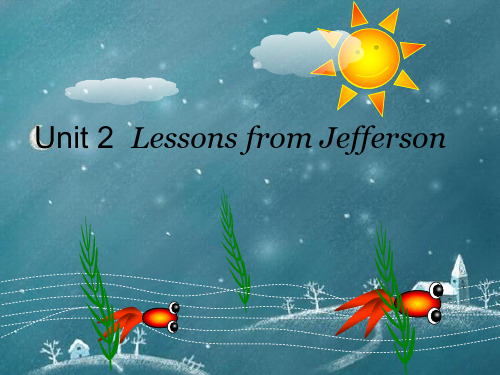
Bill Clinton (1946-): the 42nd President of the United States (1993-1996) and the first president born after World War II, elected to a second term in 1996.
Language focus
Declaration n. document containing an open public announcement
Obama will make a declaration of candidacy again for the presidential campaigns in 2012.
她从影片中学到很多知识。
attain 正式用语,指经过艰苦努 力才使人达到完美境地。
4.In F1,racing car ___ a speed greater than 300 km per hour. A. assume B. accomplish C. attain D. assemble 方程式F1,赛车的车速每小时高达300 公里。
Investigation n. detailed or careful examination
Last week, FBI released an investigation report on Steve Jobs.
North China launches investigation into death of 1,000 pigs.
Let's appoint a time for the meeting. 我们定个时间开会吧.
appointment n. 约会,约定; 任命,委派
- 1、下载文档前请自行甄别文档内容的完整性,平台不提供额外的编辑、内容补充、找答案等附加服务。
- 2、"仅部分预览"的文档,不可在线预览部分如存在完整性等问题,可反馈申请退款(可完整预览的文档不适用该条件!)。
- 3、如文档侵犯您的权益,请联系客服反馈,我们会尽快为您处理(人工客服工作时间:9:00-18:30)。
大学英语(二)课程教案主页第5 次课闽南理工学院备课笔记第5 次课Unit 2 Lessons from JeffersonI. Teaching Purposes1. Be acquainted with the background information related to the text-- Thomas Jefferson, Jefferson's Chronology, the Declaration of Independence.2. Familiarize the students with the main idea of the text.3. Master the new words and expressions.II. Teaching Procedures1. Lead-in (5 mins)2. Before Reading (40 mins)1) Warm-up questions2) Background information3) New words and Phrases3. Global Reading (45 mins)1) Introductory Remarks2) Part Division of the Text3) Comprehension of the TextIII. Teaching ContentsI) Lead-in (5 mins)II) Before Reading (40 mins)1. Warm-up questions1) Of the American presidents, how many do you know?2) Can you recognize the people in the following pictures and say something about them?2. Background information1) Thomas JeffersonThomas Jefferson (1743-1826) is best remembered as a great President and as the author of the Declaration of Independence. He also won lasting fame as a diplomat, a political thinker, and a founder of the Democratic Party. (民主党) Jefferson's interests and talents covered an amazing range. He became one of the leading American architects of his time and designed the Virginia Capitol, the University of Virginia, and his own home, Monticello. He greatly appreciated art and music and tried to encourage their advancement in the United States. Jefferson invented a decoding device, a lap desk, and an improved type of moldboard plow. His collection of more than 6400 books became a major part of the Library of Congress. Jefferson revised Virginia's laws and founded its state university. He developed the decimal system of coinage that allows Americans to keep accounts in dollars and cents. Jefferson did not consider himself a professional politician. Instead, he regarded himself as apublic-spirited citizen and a broadminded, practical thinker. He preferred his family, his books, and his farms to public life. But he spent most of his career in public office and made his greatest contribution to his country in the field of politics.2) The Declaration of IndependenceIn April 1775, colonists in Massachusetts took up arms against British troops. The American Revolution had begun. The following year, the Continental Congress in Philadelphia asked Jefferson to write a document declaring America's independence from Britain. The Continental Congress approved Jefferson's work with few changes. The Declaration of Independence was adopted on July 4, 1776. The bonds that tied the colonies to Britain were broken. Jefferson wanted the reasons for America's independence stated clearly so the world would第 1 页闽南理工学院备课笔记第5 次课understand. He wrote "all men are created equal," with rights to "life, liberty, and the pursuit of happiness." Governments are created to secure people's rights. The people could change a government that no longer protected their rights.3) Jefferson and the French RevolutionJefferson served as minister to France from 1785 to 1789 when revolution was imminent in France. He sympathized with the revolution, feeling it was similar in purpose to the American.3. New words and PhrasesMake the students read the new words and phrases, and then ask some students read the words and phrases, correct the pronunciation.III) Global Reading (45 mins)1. Introductory RemarksThomas Jefferson was the third president of the United States and the author of the Declaration of Independe nce. He was a versatile man, with interests ranged widely. Here are some of his ideas and examples as mentioned i n the text: “go and see”;“you can learn from everyone”;“Judge for yourself”;“Do what you believe is right”;“Tr ust the future, trust the young”. These are still of great benefit to us now.2. Part Division of the TextPart1 (Para.1): A brief introduction to Thomas Jefferson.Part2 (Para.2-8): Some ideas and principles given by Thomas Jefferson.Part 3 (Para 9-11):His talents in many fields and his contribution to USA3. Comprehension of the Text1) Who wrote the Declaration of Independence? ca. George Washington.b. Abraham Lincoln.c. Thomas Jefferson.d. Benjamin Franklin.2) Jefferson made on-the-spot observations of the South Branch of the James River because__b__.a. he was the youngest member of the committeeb. he believed that personal investigation was an important source of knowledgec. he was not interested in the papers about the riverd. he was sure what had been written about the river was misleading3). It can be inferred from the text that Lafayette did not understand the French Revolution because __b____.a. being a nobleman himself, he took the side of the highest social classb. he was divorced from the common peoplec. he misinterpreted the cause of dissatisfaction among the peopled. he failed to act on Jefferson’s advice4). Jefferson attached greater importance to newspapers than to a government because he believed that___a___.a. the people themselves had the ability to make correct judgments if they were well informedb. newspapers never refused to accept people’s opinions as governments often didc. no government could be trustedd. newspapers always told the truth5). Jefferson was determined never to answer his critics because __c____.a. he thought there was no sense in defending obviously correct ideas第 2 页闽南理工学院备课笔记第5 次课b. he believed silence was a source of strengthc. he believed conflict was inevitabled. he knew the more he said, the more they would resent him.6). what did Jefferson mean when he said “How much pain has been caused by evils which have never happened!”? aa. It was pointless to worry about the future.b. Evils were not to be feared.c. Constitutions and laws should be made perpetual.d. Changes in society necessarily involve pains.7). we can learn from the text that Jefferson was ___d___.a. a man of great courageb. an idealistc. a man of many talentsd. all of the above8). In Jefferson’s view, a nation could remain free only if ___a___.a. its people are well-educatedb. it is industrializedc. its people enjoy perfect equalityd. its people understand self-evident truths第 3 页大学英语(二)课程教案主页第6 次课闽南理工学院备课笔记第6 次课Unit 2 Lessons from JeffersonI. Teaching Purposes1.Make Ss further understand the text content and structure.2.Teach Ss how to use some key words and phrases in the text.3.Make Ss understand how to analyze long and complicated sentences in the text.II. Teaching Procedures1. Review the text structure and new words (10 minutes)2. Study some key words and complicated sentences in the text. (80 minutes)III. Teaching Contents1. Detailed Reading1. Go and see. Jefferson believed that a free man obtains knowledge from many sources besides books and that personal investigation is important. When still a young man, he was appointed to a committee to find out whether the South Branch of the James River was deep enough to be used by large boats. While the other members of the committee sat in the state capitol and studied papers on the subject, Jefferson got into a canoe and made on-the-spot observations.2.(L7-8)…Jefferson believed that a free man obtains knowledge from many sources besides books and that personal investigation is important.1). Explain the grammatical structure of the sentence.主句Jefferson believed 为一般过去时,而后面从句却用了一般现在时,说明叙述的内容为人们普遍接受的客观道理。
